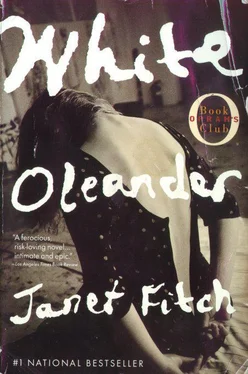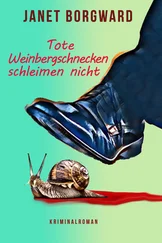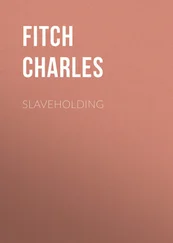Janet Fitch - White Oleander
Здесь есть возможность читать онлайн «Janet Fitch - White Oleander» весь текст электронной книги совершенно бесплатно (целиком полную версию без сокращений). В некоторых случаях можно слушать аудио, скачать через торрент в формате fb2 и присутствует краткое содержание. Жанр: Современная проза, на английском языке. Описание произведения, (предисловие) а так же отзывы посетителей доступны на портале библиотеки ЛибКат.
- Название:White Oleander
- Автор:
- Жанр:
- Год:неизвестен
- ISBN:нет данных
- Рейтинг книги:3 / 5. Голосов: 1
-
Избранное:Добавить в избранное
- Отзывы:
-
Ваша оценка:
- 60
- 1
- 2
- 3
- 4
- 5
White Oleander: краткое содержание, описание и аннотация
Предлагаем к чтению аннотацию, описание, краткое содержание или предисловие (зависит от того, что написал сам автор книги «White Oleander»). Если вы не нашли необходимую информацию о книге — напишите в комментариях, мы постараемся отыскать её.
White Oleander — читать онлайн бесплатно полную книгу (весь текст) целиком
Ниже представлен текст книги, разбитый по страницам. Система сохранения места последней прочитанной страницы, позволяет с удобством читать онлайн бесплатно книгу «White Oleander», без необходимости каждый раз заново искать на чём Вы остановились. Поставьте закладку, и сможете в любой момент перейти на страницу, на которой закончили чтение.
Интервал:
Закладка:
By eight it was already too hot to be outside. I went back inside to make Tasha’s lunch. She was the new girl in Yvonne’s bed, thirteen, going to King Junior High, D track, summer term. Grave, silent, she had a vertical scar on her upper lip just healing. She flinched if people moved too fast near her.
“You’ll do great,” I said, making her celery with peanut butter in the creases and a Granny Smith apple. “I’ll be watching.”
I drove her to school in Niki’s truck, let her off in front of Thomas Starr King Junior High, watched her go in scared and small, her backpack hanging with key chains. I felt helpless to prevent her life from taking its likely direction. Could a person save another person? She turned to wave at me. I waved back. I didn’t drive off until she was inside.
Dear Astrid,
It’s been six years today. Six years since I walked through the gates of this peculiar finishing school. Like Dante: Nel mezzo del cammin di nostra vita. / Mi ritrovai per una selva oscura. / Che la diritta via era smarrita. The third day over 110. Yesterday an inmate slit another woman’s throat with a bent can. Lydia tore up a poem I wrote about a man I saw once, a snake tattoo disappearing into his jeans. I made her tape it together again, but you can’t imagine the strain. Aside from you, I think this is the longest relationship I’ve ever had. She’s sure I love her, though it’s nothing of the kind. She adores those poems of mine that refer to her, thinks it’s a public declaration.
Love. I would ban the word from the vocabulary. Such imprecision. Love, which love, what love? Sentiment, fantasy, longing, lust? Obsession, devouring need? Perhaps the only love that is accurate without qualification is the love of a very young child. Afterward, she too becomes a person, and thus compromised. “Do you love me?” you asked in the dark of your narrow bed. “Do you love me Mommy?”
“Of course,” I told you. “Now go to sleep.”
Love is a bedtime story, a teddy bear, familiar, one eye missing.
“Do you love me, carita?” Lydia says, twisting my arm, forcing my face into the rough horsehair blanket, biting my neck. “Say it, you bitch.”
Love is a toy, a token, a scented handkerchief.
“Tell me you love me,” Barry said.
“I love you,” I said. “I love you, I love you.”
Love is a check, that can be forged, that can be cashed. Love is a payment that comes due.
Lydia lies on her side on my bunk, the curve of her hip the crest of a wave in shallow water, turquoise, Playa del Carmen, Martinique. Leafing through a new Celebridades. I bought her a subscription. She says it makes her feel part of the world. I can’t see getting excited about movies I won’t see, political issues of the day fail to move me, they have nothing to say within the deep prison stillness.
Time has taken on an utterly different quality for me. What difference does a year make? In a perverse way, I pity the women who are still a part of time, trapped by it, how many months, how many days. I have been cut free, I move among centuries. Writers send me books—Joseph Brodsky, Marianne Moore, Pound. I think maybe I will study Chinese.
“You ever go to Guanajuato?” Lydia asks. “All the big stars going there now.”
Guanajuato, Astrid. Do you remember? I know you do. We went with Alejandro the painter, as distinguished from Alejandro the poet. From San Miguel. My Spanish wasn’t good enough to determine the quality of the poet’s oeuvre, but Alejandro the painter was very bad indeed. He should not have created at all. He should have simply sat on a stool and charged one to look at him. And so shy, he could never look in my eyes until after he’d finished speaking. Instead, he’d talk to my hand, the arch of my foot, the curve of my calf. Only after he had stopped could he look into my eyes. He trembled when we made love, the faint smell of geraniums.
But he was never shy with you, was he? You had such long conversations—conspiring, head to head. I felt excluded. He was the one who taught you to draw. He would draw for you, and then you would draw after him. La mesa, la botilla, las mujeres. I tried to teach you poetry, but you were always so obstinate. Why would you never learn any thing from me?
I wish we’d never left Guanajuato.
Mother.Alejandro the painter. Watching the line flow from his fingers, the movements of his arm. Was he a bad painter? It never occurred to me, as it never occurred to me that she could have felt excluded. She was beautiful there, she wore a white dress, and the buildings were ochre and yellow, her sandals crisscrossed like a Roman’s up her leg. I traced the white X’s when she took them off. The hotel with screens and scrollwork around the door, the rooms open to the tiled walkway. You could hear what everybody was saying. When she smoked a joint she had to blow it out the balcony doors. It was a strange room, ochre, taller than it was square. She liked it, said there was room to think. And the bands of mariachis competed in the street below, the sound of concerts every night, from our beds under the netting.
“So?” Rena said. “Is she getting out?”
“No,” I said.
Driving up from San Miguel de Allende in his toy-sized Citroen car, his shirt very white against his copper skin. Was she admitting she made a mistake? If only she could admit it. Confess. I might lie for her then, talk to her lawyer, take the stand and swear beyond a shadow of a doubt that she never. Perhaps this was as close as she would get to admitting a thing. I wished we had stayed in Guanajuato too.
THEN NIKI moved out. She was joining a Toronto band, it was one of Werner’s. “Come with me,” she said as she loaded her pickup. I handed her a suitcase, zebra-striped. We both smiled, checked each other for tears. She left me some addresses and phone numbers, but I knew I wouldn’t be using them. I had to face this, that people left and you didn’t see them again.
Within a week, Rena moved two new girls into Niki’s room, Shana and Raquel, twelve and fourteen. Shana had epilepsy, and Raquel couldn’t read, it was her second time in seventh grade. More broken children for Rena Grushenka’s discount salvage yard.
SEPTEMBER came with its skirts of fire. Fire up on the Angeles Crest. Fire in Malibu, Altadena. Fire all along the San Gabriels, in the San Gorgonio wilderness, fire was a flaming hoop the city would have to jump through to reach the blues of October. In Frogtown, we had three shootings in one week—a holdup at the ARCO station, a lost motorist caught on a dead-end street in a Van Gogh midnight, a woman shot by her out-of-work electrician husband during a domestic dispute.
It was in the furnace of oleander time that Susan finally called. “I had a trial,” she explained. “But we’re back on track. I’ve scheduled you a visit, day after tomorrow.”
I was tempted to balk, tell her I wasn’t available, make things difficult, but in the end I agreed. I was as ready as I would ever be.
So on a morning already surrendered to the scourging wind and punishing heat, Camille Barren, Susan’s assistant, came for me, and we took the long drive out to Corona. In the visitors yard, we sat at an orange picnic table under the shade structure, drinking cold cans of soda from the pop machine, wiping them across our foreheads, pressing them to our cheeks. Waiting for my mother. Sweat dripped between my breasts, down my back. Camille looked wilted but stoic in her beige sheath, her fashionable short haircut limp and sweaty around the edges. She didn’t bother to talk to me, she was only the errand girl. “Here she comes,” Camille said.
Читать дальшеИнтервал:
Закладка:
Похожие книги на «White Oleander»
Представляем Вашему вниманию похожие книги на «White Oleander» списком для выбора. Мы отобрали схожую по названию и смыслу литературу в надежде предоставить читателям больше вариантов отыскать новые, интересные, ещё непрочитанные произведения.
Обсуждение, отзывы о книге «White Oleander» и просто собственные мнения читателей. Оставьте ваши комментарии, напишите, что Вы думаете о произведении, его смысле или главных героях. Укажите что конкретно понравилось, а что нет, и почему Вы так считаете.












